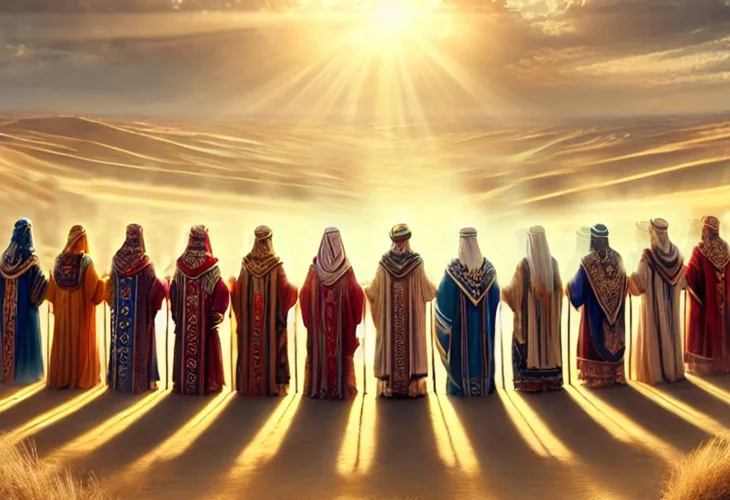Issues in the Bible
Vayigash: The Power of Yehuda's Approach — How Courage and Humility Heal Division
The balance between strength and surrender, and the timeless message of unity in times of exile and redemption

Parshat Vayigash tells the story of Yaakov and his sons descending to Egypt — the beginning of the nation’s exile. Yet, the Torah names the portion Vayigash (“And he approached”) because the turning point came not from Yosef’s plans, but from Yehuda’s bold approach.
Yosef had been manipulating his brothers with various tests and accusations, and the Torah does not reveal what else he intended to do. But when Yehuda “approached him,” everything changed — Yosef could no longer restrain himself, and the reunion that shaped history began.
Yehuda’s Threefold Strategy: Submission, Emotion, and Threat
Like his father Yaakov, who prepared for Eisav with gifts, prayer, and readiness for battle, Yehuda came prepared with three tools: humility, appeal to emotion, and subtle threat.
The Torah hints at the threatening tone: “Vayigash elav Yehudah” — "Yehuda approached him.” This verb usually implies approaching for battle or for judgment. People do not “approach” kings — they stand before them and bow. But here, the sages detect an undertone of confrontation.
At the same time, Yehuda’s words overflow with humility: “My lord asked his servants… your servant, my father…” Yet the core of his speech is emotional — he speaks to Yosef’s heart, describing the family’s pain and his father’s anguish.
That heartfelt appeal is what breaks Yosef. The man who had all the power, who had been the accuser and tester, suddenly becomes the one who weeps and reveals himself.
When Strength Meets Surrender
The Torah teaches that this moment of transformation was not Yehuda's victory over Yosef, but their victory together. Yosef didn’t crush his brothers; rather, through Yehuda's courageous confrontation — a mix of strength, humility, and words that came from the heart, Yosef himself surrendered.
Yehuda was a warrior, a man of might, yet he also had the strength to yield. That balance — the courage to fight and the humility to submit, is at the essence of teshuvah (spiritual return). Yehuda initiated this encounter to show both sides of his power: “I can fight, but I also yield to you. I want you to understand what is truly at stake.”
Yosef, in turn, did not surrender from dominance but from recognition. He saw Yehuda’s strength of soul and yielded willingly. That’s why their reconciliation endured — born of mutual respect and acknowledgment, lasting for centuries until the later division of the tribes during the monarchy.
Had Yosef simply “granted mercy,” it would never have lasted. Real unity cannot be one-sided.
The Exile Begins — and So Does the Inner Division
The story of Yehuda and Yosef marks the beginning of Israel’s life in the Egyptian exile. One of the greatest dangers of exile is internal division. When a people are scattered, when they no longer gather around a shared spiritual center, they lose not only their land but also their unity.
When children are exiled from their father’s table, they grow apart from one another.
Chanukah, Purim, and the Mirror of Yosef’s Story
The story of Yosef and his brothers is always read around Chanukah time — and it shares deep parallels with the Book of Esther. Mordechai and Esther were descendants of Binyaim, Yosef's younger brother, and the patterns of both stories reflect one another.
Both Purim and Chanukah are festivals of exile. The Purim miracle occurred when prophecy still existed and thus entered the Bible through divine inspiration. The Chanukah miracle, in contrast, happened after prophecy had ceased, and the holiday was instituted by the sages.
Yet, during Chanukah, there was a Jewish kingdom and a rebuilt Temple. The tragedy, however, was that the people were divided — so divided that the Divine Presence (Shechinah) did not rest in the Second Temple (Talmud Yoma 21a).
Two Paths to Salvation: Purim and Chanukah
In the story of Purim, the Jews initially succumbed — they participated in Achashverosh's feast and assimilated. But when Haman’s decree struck, they united in humility, fasting and repentance, and that spiritual surrender brought the miracle.
In Chanukah, the threat came from within — from the Hellenized Jews who betrayed their faith. Here, the Jews used force: the courage of the few overcame the many, and that military courage brought the miracle and restored unity.
After Purim, the Jews remained in exile, for their unity was born of fear and submission. After Chanukah, they established a kingdom — but one based only on might, without humility. The sages were not pleased with this kingdom; strength without surrender lacks the soul of holiness.
The Redemption Ahead: Balancing Force and Faith
The complete and final redemption will unite both powers: the courage of Yehuda and the humility of Yosef.
In the birth pangs of Mashiach, we will experience both: times of suffering that force us to surrender and unite, and times of divine victory that awaken our strength and confidence. True redemption will come when these two forces of inner humility and outer courage meet.
Healing Division: Becoming Like Yehuda
To heal our inner divisions, we must learn from Yehuda. We need the courage to act, but also the humility to yield. Unity built only on fear or temporary pressure will never endure. Lasting unity requires both: the strength to stand tall and the humility to reach out.
That is the legacy of Vayigash — when one man dared to step forward, and through courage and compassion, brought brothers, and a nation, back together.

